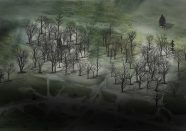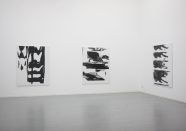 |
Newsletter |
 My dear readers, I will start with a quote: “Beneath those corridors of shining tiles were rooms, tier below tier, reaching far into the earth, and in each room there sat a human being, eating, or sleeping, or producing ideas. And buried deep in the hive was her own room. Vashti was afraid. “O Machine!” she murmured, and caressed her Book, and was comforted.” So says one of the characters in E.M. Forster’s short story, ‘The Machine Stops’, published some 110 years ago. In it, Forster imagines a dystopian world where humans are repulsed by the planet and live beneath the earth’s crust in pods, slaves to a machine of efficiency and productivity. This future society is marked by a fear of touch, eroticism, intimacy and connection. They socialise, but only by means of a two-way video screen, “the cinematophote”, and they are connected to everything but only by means of buttons. How wrong, this society laughs, was the preceding “civilization that had mistaken the functions of the system, and had used it for bringing people to things, instead of for bringing things to people”! As we are now entering into the festive season, when – thank God/machine! – Amazon prime and the simple push of a button or swipe of a screen can bring things to distant people we probably should stay in touch with, I do not want to dwell too much on dystopian futures and melancholic thoughts (my mental proclivity to such things notwithstanding). And afterall, some wonderful things have and will happen that can drive a poetic wedge between the buy-now! (i)Pods of connectivity. For instance, Johannes Heldén, Rupert’s current resident, recently gave an artist talk at Vilnius Academy of Arts on the 10th of December. Johannes’ interdisciplinary works, which consider poetry, ecology, artificial intelligence, sentience and narrative structures, offer a different way of looking, being and thinking than the ones in Forster’s dystopian world and its characters who were determined to be “independent of meteorology” and the “contingencies” of the natural environment. Have a look here or see his poetry project presented through an algorithm. Of course, the good thing about the machine-system-world that Forster describes is that you can easily turn on and off social relationships by swiping left or right. Alas! How much more complicated life is and all the messiness of emotions, intimacy, feeling…no wonder that we’ve had to invent various protocols of social relations, like honor and dignity, which Povilas Dikavičius will explore in his lecture ‘Of Honor and Dignity and the Renaissance Grand Duchy of Lithuania’. And if you haven’t been honorable enough to visit Glasgow (where you can never be independent of meteorology) then you still have one more week to see Robertas Narkus’ exhibition at David Dale gallery. Before my machine stops thanks to the built-in obsolescence of my computer battery, I wish you a merry festive season. And because I am a disembodied voice you only access in your inbox on your cinematophote, you can make digital contact with me on Instagram, Facebook and my website. Or visit us in person (the horror!) in Vilnius, or even better send things to people and ship me a gift. Kisses, Rupert Lithuania

In residence
Johannes HeldénJohannes Heldén (SE) is a visual artist, writer and musician. His interdisciplinary works deal with poetry, ecology, artificial intelligence, sentience and narrative structures. At Rupert, he is researching for a project exploring the format of the novel through non-human narratives, science fiction and sound. 
In residence
Gabrielė AdomaitytėGabrielė Adomaitytė (LT/NL) graduated from Vilnius Art Academy in 2017 and until 2019 Spring had been enrolled in the De Ateliers residency, Amsterdam. In her practice, the artist explores painting’s potential to question forms of visual representation. At Rupert, the artist is working on a project about an archive of experiences and images. She is examining a story and a documentary of one Lithuanian man who had been recording his mundane life through the history of Soviet transport and technology developments. |

Public Talk
17 December, 6:30pm Of Honor, Dignity and the Renaissance Grand Duchy of LithuaniaRupert is pleased to invite you to the public lecture ‘Of Honor, Dignity and the Renaissance Grand Duchy of Lithuania’ by historian and researcher Povilas Dikavičius on the 17th December, Tuesday from 6:30 pm at Rupert (Vaidilutės str. 79, Vilnius). The event is free of charge and will be held in Lithuanian. More information. 
in residence
Mateusz KowalczykMateusz Kowalczyk (PL) is a visual artist, performer, activist. Currently, an MA student at the Faculty of Media Art at the Academy of Fine Arts in Warsaw. His interests include shamanism, collective work, and artistic involvement in protests. The main axis of his practice is the creation of interactive experiences, to which he uses: the installations and the objects in urban and art gallery spaces, performance, live music. Artist currently works in medium of the virtual reality, on experiences inspired by anthropocene. This residency is organised in collaboration with Hestia Artistic Journey Foundation (Warsaw). Lithuania
|
